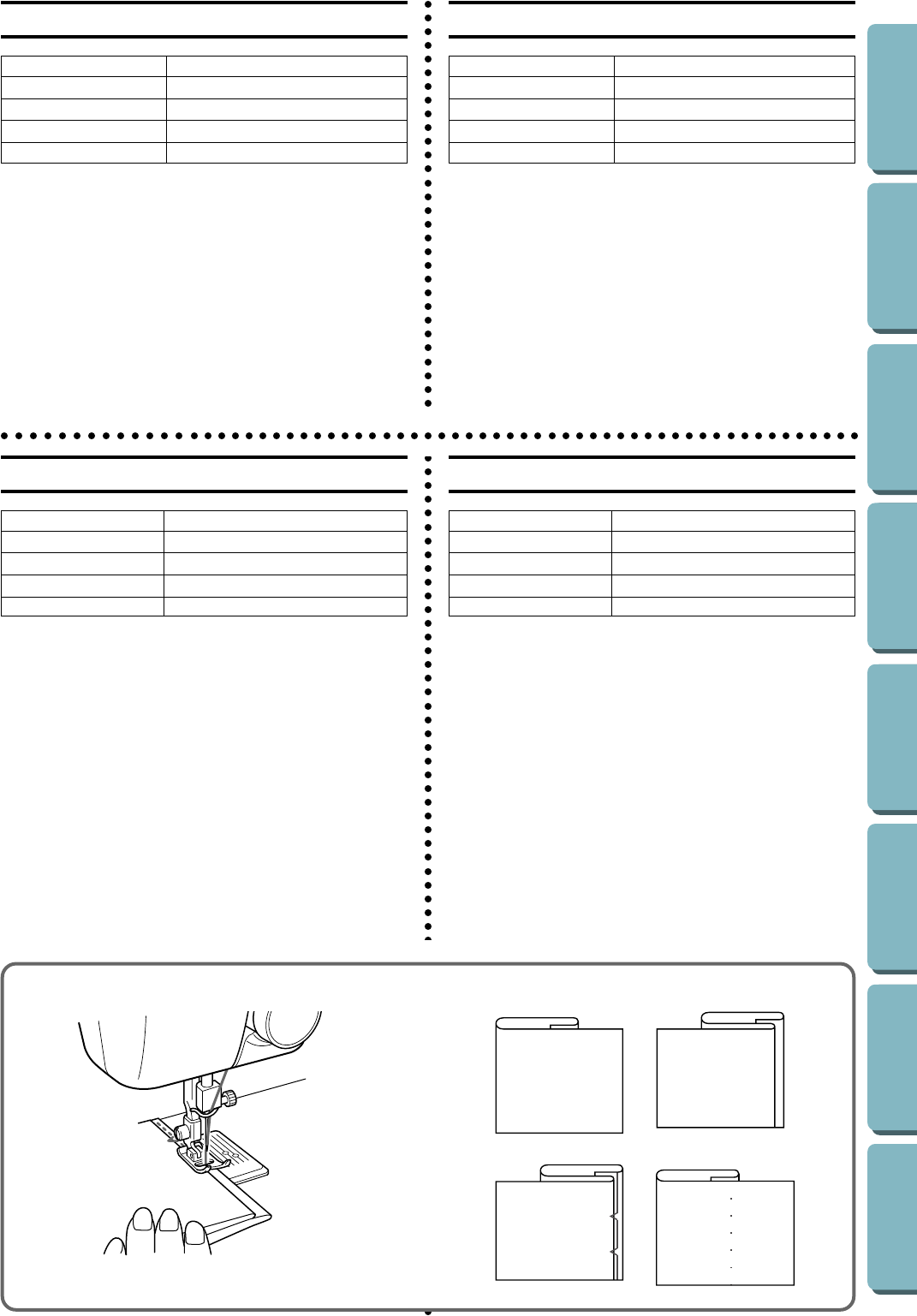
48
CONTENTS KNOWING YOUR
SEWING MACHINE
STRAIGHT AND ZIGZAG
STITCHING
BUILT-IN STITCHES
USING ATTACHMENTS
AND APPLICATIONS
BUTTONHOLE
AND
BUTTON SEWING
MAINTENANCE
INDEX
A
B
C
D
Blind Hem Stitch
STITCH LENGTH 2-3
STITCH WIDTH 3-5
NEEDLE POSITION R
PRESSER FOOT Zigzag
NEEDLE Single
The Blind Hem Stitch is used to finish the edge of a project, like the
bottom of a pair of pants, without the stitch showing.
1. Both the upper and lower threads should be the same color as the
fabric.
2. Fold back the fabric to the desired location of the hem as shown in
fig. A. Then, fold the edge of the fabric as in fig. B. Leave a 6 mm
(1/4") overlap at the edge.
3. Sew 5-6 stitches on the fold as in fig. C using the R needle position,
a straight stitch (0 width) and stitch length of 3-4. Quickly set the
width to 2-3, sew 1 stitch and set the width back to 0. Repeat.
4. When the fabric is unfolded, you will have a Blind Stitch hem as
shown in fig. D.
Point d’ourlet invisible
Longueur de point 2-3
Largeur de point 3-5
Position de l’aiguille R
Pied-de-biche Zigzag
Aiguille Simple
Le point d’ourlet invisible sert à terminer le bord d’un ouvrage, par
exemple l’ourlet d’un pantalon, sans que les points ne soient visibles.
1. Les fils supérieur et inférieur doivent être de la même couleur que
le tissu.
2. Plier le tissu à l’endroit souhaité pour l’ourlet comme l’indique la
fig. A. Puis replier le bord du tissu comme l’indique la fig. B. en
faisant chevaucher de 6 mm .
3. Faire 5-6 points sur le repli comme l’indique la fig. C en utilisant la
position d’aiguille R, un point droit (largeur 0) et une longueur de
point de 3-4. Régler rapidement la largeur sur 2-3, faire un point et
remettre la largeur sur 0. Refaire de même.
4. Lorsque le tissu est déplié, on obtient un ourlet invisible comme
l’indique la fig. D.
Puntadas invisibles
Largo de puntada 2-3
Ancho de puntada 3-5
Posición de la aguja R
Prensatelas Zigzag
Aguja Simple
La puntada de dobladillo invisible sirve para terminar la orilla de una
obra, como puede ser el borde inferior de unos pantalones, sin que
se vea la costura.
1. Los hilos superior e inferior deben ser del mismo color que el
tejido.
2. Doble el tejido donde quiera hacer la costura como indica la fig.
A. Luego, dele la vuelta como muestra la fig. B. Deje que se
superpongan 6 mm (1/4") de tejido en la orilla.
3. Cosa 5 ó 6 puntadas en el pliegue como indica la fig. C usando
la posición R para la aguja, una puntada recta (ancho 0) y un
largo de puntada de 3 ó 4. Ajuste rápidamente el ancho en 2 ó 3,
cosa una puntada y vuelva a poner el ancho en 0. Repita la ope-
ración.
4. Al desdoblar el tejido, tendrá un dobladillo con puntada invisible
como el que muestra la fig. D.
Bainha com Ponto Invisível
Comprimento do Ponto 2-3
Largura do Ponto 3-5
Posição da Agulha R
Pé Calcador Para Zigzag
Agulha Simples
A Bainha com Ponto Invisível é usada para o acabamento da borda de um
projeto, tal como a barra de uma calça, sem que o ponto apareça.
1. Ambas as linhas superior e inferior devem ser da mesma cor do tecido.
2. Dobre de volta o tecido no local desejado para bainha, conforme mostra
a fig. A. A seguir, dobre a borda do tecido como mostra a fig. B. Deixe
um 6 mm (1/4") de tecido sobreposto na borda.
3. Costure 5-6 pontos na borda como mostra a fig. C, usando a posição de
agulha R, um ponto reto (largura 0) e um comprimento de ponto de 3-4.
Regule rapidamente a largura a 2-3, costure um ponto e regule a largura
de volta a 0. Repita.
4. Quando o tecido for desdobrado, você obterá uma Bainha de Ponto In-
visível conforme mostra a fig. D.


















